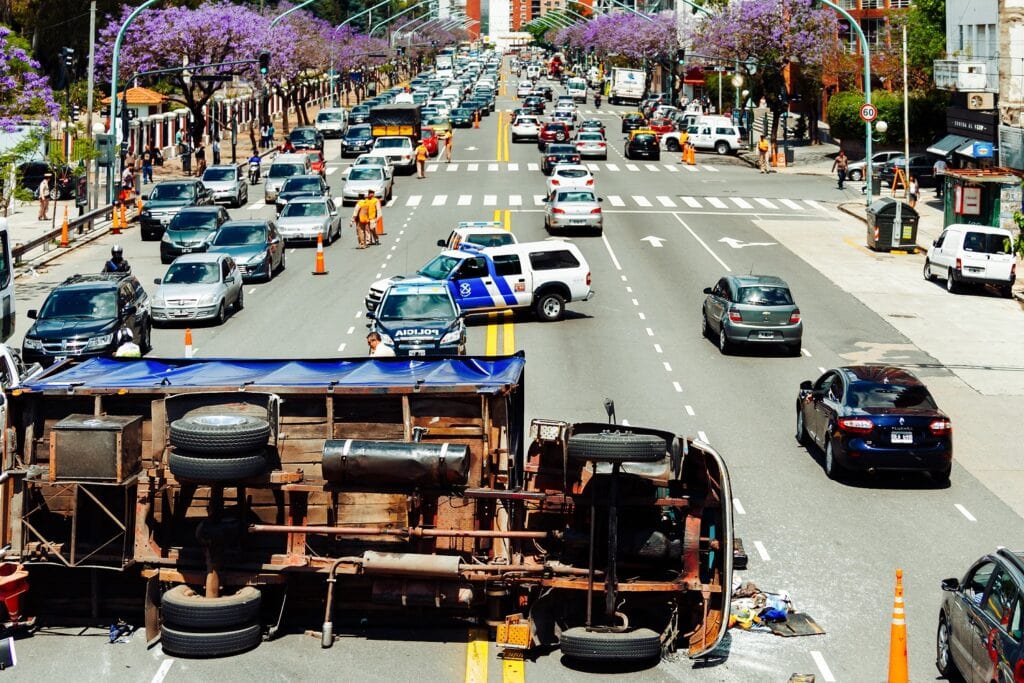This 6-step guide can help make the moments after a car accident less stressful — and the claims process a whole lot smoother.
- Move to a safe area (if you can) …
- Stop your vehicle and get out. …
- Check on others involved. …
- Call the police to the scene. …
- Gather info. …
- Document the scene. …
1. Move to a safe area (if you can) – If it’s safe to do so and you aren’t seriously injured, move your car out of further harm’s way, like to the shoulder of the road. If moving your car just isn’t possible, flip on your hazards to warn other drivers that your vehicle isn’t going anywhere any time soon.
2. Stop your vehicle and get out – Make sure your car is no longer moving, turn off the engine, shift into park, or set the hand brake if you drive a manual. Take a moment to catch your breath. Check to make sure it’s safe to get out of your car before opening the door. If you have flares or similar road safety items, consider using them.
3. Check on others involved – Check on all the other parties involved, including drivers, passengers, and pedestrians, to make sure no one is hurt. Call 911 if anyone may be injured. Even a seemingly minor symptom like dizziness should be checked out by a health care professional.
4. Call the police to the scene – Even in minor accidents, a police accident report can prove invaluable when dealing with your car insurance company and other drivers. Cooperate fully but avoid admitting fault or blaming others while at the scene. Let the police objectively judge events and determine who, if anyone, is at fault in the crash.
If the police can’t make it to the scene (which is more likely if there are no injuries), you can file an accident report through your state’s DMV.
5. Gather info – Try to write down as much info as possible in the accident aftermath, including:
- Driver and passenger names
- License plate numbers
- Insurance info
- Makes and models of all vehicles involved
- Contact info for any eyewitnesses
- Location of the accident
- The name and badge number of any responding police officers
6. Document the scene – If you have a smartphone with a camera, snap some photos of the accident scene. They’ll come in handy during the intake process.
Immediately following a car accident, consider taking the following actions:
- Step 1: Check yourself for injuries.
- Step 2: Check on the well-being of your passengers.
- Step 3: Get to safety.
- Step 4: Call 911.
- Step 5: Wait for help.
- Step 6: Exchange information.
- Step 7: Document the accident.
Immediately After the Vehicle Accident
- Stay safe. Assess the situation for your immediate safety.
- Stay in your car if there is a risk of injury or if moving might put you at risk of further injury.
- Move to a safe location if your car is creating a safety hazard or obstructing traffic.
- Do not leave the scene of the accident!
- Determine if there are any injuries.
- Call 911 immediately to report the accident and get help to the scene, if needed.
- Follow any instructions the police give you.
- Call your insurance company.
- Follow any instructions given to you by your agent.
- Request a tow through your insurance company, if possible.
- Note the name of the tow company and location to which your vehicle is towed.
At the Scene of the Accident: Gathering Information
- Be courteous and polite, but do not admit fault.
- Take the names and car insurance information of any drivers involved in the accident.
- Only ask for contact information if the other drivers do not provide insurance information.
- Get names and contact information for any witnesses to the accident.
- Provide your name and insurance information to the police and to other driver(s).





